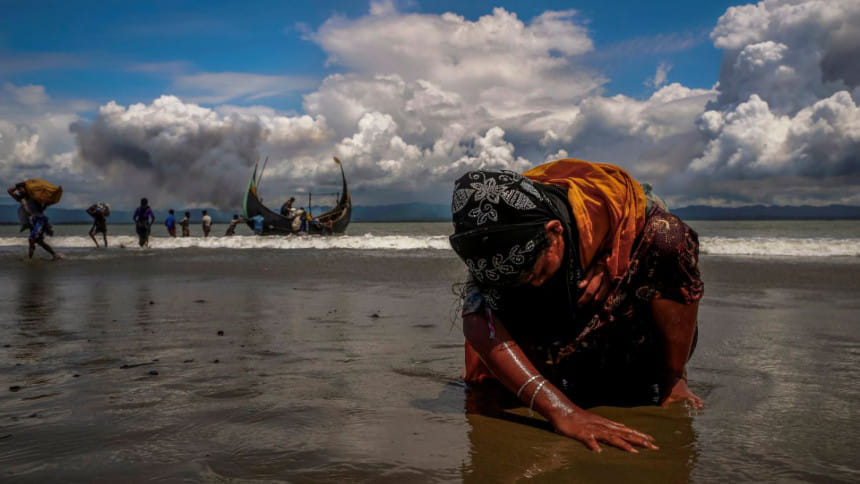Rohingya crisis: The long view

There is no dearth of opinion on the Rohingya repatriation issue with political leaders, scholars, and even ordinary people all weighing in with their own views. Given the current impasse, one cannot be faulted for a pessimistic view of the ongoing diplomatic efforts by the Bangladesh government and Myanmar's handling of the repatriation issue. Naypyidaw's initial deal for repatriation subsequently withered in early 2018 with a profound decline in interest, followed by a security blanket in the Rakhine state. There is apparently very little confidence among the Rohingyas in Cox's Bazar in the possibility of a return anytime soon due to the ongoing monk-military-led crackdown and atrocities against the remaining 300,000 Rohingya Muslims in Myanmar.
It has been already two years since some 800,000 Rohingyas fled the violence and persecution in Rakhine to join an earlier group of more than 200,000—forced out of Myanmar in the 1990s—in Bangladesh. Of them, only 50,000 have official refugee status in the country; the rest are living in Cox's Bazar camps mired in legal limbo, as forcefully displaced Myanmar nationals. A recent report based on a survey of approximately 2,100 Rohingyas focused on the plight of the displaced who are living under very difficult circumstances in the camps. The situation in camps is increasingly becoming tense, presenting both immediate and long-term challenges for the aid agencies and the host country, leaving the latter with an enormous humanitarian burden and growing social problems without any prospect for repatriation.
The current status quo surrounding the crisis indicates the need for a long view requiring simultaneous and protracted engagements on many fronts for a sustainable solution, including further support to the displaced Rohingyas in the camps.
No matter how quickly the Bangladesh government wants the repatriation, a longer-term plan with appropriate policies is now required to support the Rohingya population. Any hope for an early crisis resolution would be misplaced, because the Rohingya crisis has many components to resolve—for example, their rights to return with citizenship, appropriate conditions in Rakhine for a safe return, readiness by the Rohingyas, geo-political power struggles among neighbouring countries, and the role of the international community. It may take years, even up to a decade, to find a just and viable solution. The current status quo surrounding the crisis indicates the need for a long view requiring simultaneous and protracted engagements on many fronts for a sustainable solution, including further support to the displaced Rohingyas in the camps. The followings are a few areas of work that Bangladesh should pay attention to for a resolution of the crisis in the long run.
Work within and outside the UN system
While the prospect for some progress in negotiations remains elusive, the Bangladesh government should continue its current diplomatic efforts both within and outside the UN system. Unfortunately, the world body, particularly its Security Council, has failed to rise above petty politics despite the "textbook" case of genocide committed by the Myanmar military. To date, the Myanmar military and the government remain unrepentant about the atrocities committed against the Rohingyas. They are also unmoved by the international demand for justice and trial of the Myanmar generals for their war crimes in Rakhine state. Despite this, the involvement of UN agencies such as UNHCR and UNDP remains critical for the repatriation process and for creating conditions in Myanmar conducive to a voluntary and sustainable repatriation of the Rohingyas.
Engage with friendly, powerful neighbours to find a resolution
Since the UN has failed to resolve the crisis, Bangladesh should work with the powerful regional forces such as India, China and Japan to drum up support for a durable and early solution. Japan has expressed its full support to the Rohingya repatriation issue. India has not been much supportive of Bangladesh's efforts and has rather expelled many Rohingya refugees who took shelter in the country. Further, India never extended its support to Bangladesh in any international forum to solve the crisis. Indeed, Dhaka has failed to secure any support from notable Myanmar-backers such as China, Russia and India, who have economic and military ties worth billions. As a result, Bangladesh seems to have failed to prove itself as strategically more important than Myanmar. This may hopefully change with the visit of Prime Minister Sheikh Hasina to China in July to press the Rohingya issue for a solution.
Work closely with Naypyidaw
There has been almost a diplomatic deadlock between Dhaka and Naypyidaw since the failed repatriation bid in November 2018. The communication channels are nearly closed with mutual accusations on many issues, including excuses for delaying repatriation of the Rohingyas. As a result, Dhaka is not in control of the Rohingya issue although it continues to pay a heavy price in many ways. Diplomacy, negotiation and regular contacts should be helpful to develop common grounds for repatriation that may break the deadlock.
Support the Rohingyas and host population
The Rohingyas living in camps must be heard and consulted. Relief and rehabilitation are not enough; there should be ways to explore and accommodate the needs of the Rohingyas in terms of their aspirations, the future of the children as well as their education and work both in the short- and long-term contexts, including those of the host communities. This will require consultation, effective communication and engagements with the Rohingyas in all matters related to the camps and camp governance. Further, the Rohingyas should be considered stakeholders in any international dialogues for relocation and repatriation.
Time to step up international pressure
Bangladesh and the international community should put pressure on Myanmar to create necessary conditions in Rakhine for the repatriation of the Rohingyas. There are unforeseen risks associated with delays and playing with the Rohingya issue. Recently, Bangladesh raised the issue at an international forum in China largely to seek Chinese and other Asian nations' involvement to resolve the crisis for the sake of regional peace and stability. The international community must realise the potential security threats that a protracted crisis poses unless it is resolved by compelling Myanmar to take back its displaced nationals from Bangladesh. The Rohingya crisis requires fresh collective action by all peace-loving countries.
Mohammad Zaman is an international development/resettlement specialist and advisory professor at the National Research Centre for Resettlement (NRCR), Hohai University, Nanjing, China.
Email: [email protected]
Follow The Daily Star Opinion on Facebook for the latest opinions, commentaries and analyses by experts and professionals.
To contribute your article or letter to The Daily Star Opinion, see our guidelines for submission.

 For all latest news, follow The Daily Star's Google News channel.
For all latest news, follow The Daily Star's Google News channel. 



Comments